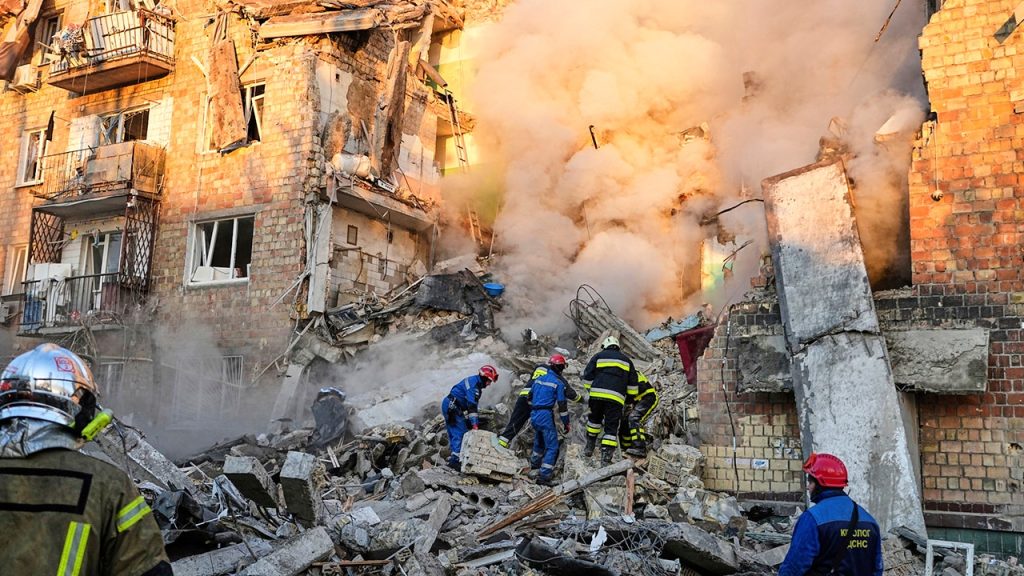Russia’s Deadly Attack on Kyiv: Human Cost and International Response
In a devastating overnight assault on Kyiv, Russia launched one of its largest attacks in recent months, leaving at least 17 people dead, including four children between the ages of 2 and 17. The attack, which wounded 48 others, targeted residential areas and caused extensive damage to civilian infrastructure throughout Ukraine’s capital. Emergency crews rushed to more than 20 locations across the city, with rescuers digging through rubble of partially destroyed apartment buildings in search of survivors. The human toll of this attack highlights the ongoing brutality of a conflict that continues to claim innocent lives while diplomatic solutions remain elusive.
“Russia chooses ballistics instead of the negotiating table,” Ukrainian President Volodymyr Zelenskyy stated in the aftermath, his words reflecting both grief and frustration. The attack’s deliberate targeting of residential buildings reinforces a pattern that Ukrainian officials describe as “systematic” violence against civilians. In the Darnytskyi district, emergency workers combed through the remains of a five-floor building partially reduced to rubble, while fires burned across multiple neighborhoods. The timing of this assault is particularly notable, coming shortly after recent high-profile meetings between former U.S. President Donald Trump and both Russian President Vladimir Putin and President Zelenskyy, raising questions about Russia’s willingness to engage in meaningful peace negotiations.
The scale of the attack was massive by any measure, with Ukrainian air defense forces reporting they intercepted 563 of 598 drones and 26 of 31 missiles launched across the country. Despite this remarkable defensive effort, strikes still hit 13 locations while debris fell at 26 sites, demonstrating the overwhelming nature of Russia’s assault and the continued vulnerability of Ukrainian cities despite advanced air defense systems. Tymur Tkachenko, head of Kyiv’s military administration, described the Russian strategy as “combined strikes, from different directions” deliberately aimed at “ordinary residential buildings” – a tactic that maximizes civilian casualties and psychological impact while minimizing military significance.
President Zelenskyy used the attack to call for “new, tough sanctions against Russia,” arguing that “all deadlines have already been broken, dozens of opportunities for diplomacy ruined.” His statement reflects Ukraine’s ongoing frustration with what they perceive as insufficient international consequences for Russia’s actions, suggesting that “Russia still does not fear the consequences” and “takes advantage of the fact that at least part of the world turns a blind eye to murdered children and seeks excuses for Putin.” The emotional appeal highlights the stark reality that, despite numerous rounds of sanctions and international condemnation, Russia continues to execute large-scale attacks on civilian targets with devastating human consequences.
The international response was swift, with António Costa, president of the European Council, expressing horror at “yet another night of deadly Russian missile attacks on Ukraine.” He noted that even the European Union delegation building in Kyiv sustained damage in what he described as a “deliberate Russian strike.” Costa’s declaration that “the EU will not be intimidated” and that “Russia’s aggression only strengthens our resolve to stand with Ukraine and its people” reinforces the continued solidarity of European nations with Ukraine, though questions remain about the effectiveness of this support in deterring further Russian aggression or bringing the conflict closer to resolution.
As rescue operations continue and families mourn their losses, this attack serves as a painful reminder of the war’s persistent human cost nearly two and a half years after Russia’s full-scale invasion began. The contrast between the suffering in Kyiv and Russia’s Defense Ministry statement claiming to have intercepted 102 Ukrainian drones overnight highlights the profound information disconnect that continues to characterize this conflict. With each civilian death, the prospects for peaceful resolution seem to recede further, leaving Ukrainians to endure continued attacks while hoping that international support will eventually help secure their safety and sovereignty. As Zelenskyy noted in his somber message, “Russia must feel accountable for every strike, for every day of this war” – a goal that remains elusive despite the mounting human toll.


